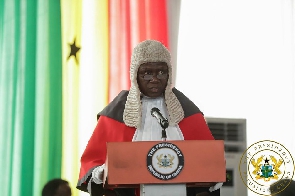A youth activist, Ekow Djan has criticized Chief Justice Anin-Yeboah for his action against Member of Parliament for Bolgatanga East, Dr. Dominic Ayine.
Mr Anin-Yeboah has referred to the General Legal Council for investigation comments made by the former deputy Attorney General.
Dr. Ayine reportedly questioned the independence of Ghana’s judiciary in a CDD-Ghana Roundtable Discussion on ‘Presidential Election Petitions and their Impact on Africa’s Democracy’. His assertion, he explained was informed by the manner in which the 2020 Presidential Election Petition case was handled by the Supreme Court.
During the discussion, Dr. Ayine among other things said that the Supreme Court in the adjudication of the election petition failed to apply the rules of procedure and continuously dismissed the plaintiff’s applications.
“I expected the Supreme Court to apply faithfully the rules of procedure to – in terms of adducing evidence – prove the petitioner’s case and so on. What we saw was a Supreme Court that was constantly putting hurdles in the way of the petitioner in terms of adducing evidence to prove the petitioner’s case."
Commenting on this development in a short statement, Mr Ekow Djan who is also an educationist noted that worse comments have been passed about judges in this country by other persons yet nothing was heard from the Chief Justice.
“CJ Anim-Yeboah was in Ghana when Kennedy Agyepong sat on a National TV to insult and [allegedly] threatened to kill Judges,” the statement said.
It further accused the Chief Justice of pretending he never heard of it.
“Dr. Ayine speaks at a forum and the CJ goes haywire? Please, the Office of the CJ is a dignified one.”
Executive Director of the Center for Democratic Development (CDD-Ghana) Professor H Kwesi Prempeh has also described the action taken by the Chief Justice Anin-Yeboah as bizarre, and ill-advised.
Professor Prempeh in a Facebook post said “That an opinion expressed at such a forum, to contestation from other participants, would cause anyone to lodge a formal complaint with the Disciplinary Committee of the General Legal Council is unprecedented, bizarre, and ill-advised.”
He added “So, now members of the Ghana Bar cannot offer a personal unflattering opinion of the judiciary on an academic, a civil society or other public discussion platfrom, even after a case has been decided, without risking being hauled before the Disciplinary Committee of the General Legal Council? Really?
“On the same platform where this lawyer expressed the opinion that has earned him an invitation to appear before the Disciplinary Committee of the legal profession’s regulator, other panelists, including other lawyers, strongly disagreed with him in his opinion of the judiciary regarding the case under discussion, with some praising the court’s handling of the matter. In other words, the platform on which the lawyer spoke was a veritable marketplace of ideas and opinion, with panelists debating each other in frank, open dialogue.
“This, incidentally, was a webinar discussion organized by CDD-Ghana, in collaboration with the KNUST law faculty, as part of a new “Judicial Review” series (a partnership between CDD and two law faculties in Ghana) that aims to review and examine decisions of the courts for their impact on democracy and good governance. This particular panel, which examined the recent Ghana election petition through a comparative lens, featured two foreign participants (from Kenya and Zimbabwe), four Ghanaian lawyers, and me.
“That an opinion expressed at such a forum, to contestation from other participants, would cause anyone to lodge a formal complaint with the Disciplinary Committee of the General Legal Council is unprecedented, bizarre, and ill-advised. Not only is this bound to have a chilling effect on the free speech rights of lawyers, it will also impact negatively on both academic freedom and the freedom and ability of civil society to promote judicial accountability, including through projects like the Judicial Review series.
“I find no justification whatsoever for the Disciplinary Committee of the GLC to be brought into this matter or to investigate Dr. Dominic Akuritinga Ayine for the opinion he expressed on the panel. It cannot be ok for a lawyer to praise a court for its handling of a matter but an act of professional misconduct–or contempt of court–for another lawyer to express a contrary view of the same court about the same matter.”
General News of Friday, 4 June 2021
Source: 3news.com

















